Samba is a free software re-implementation of the SMB networking protocol, and was originally developed by Andrew Tridgell. Samba provides file and print services for various Microsoft Windows clients and can integrate with a Microsoft Windows Server domain, either as a Domain Controller (DC) or as a domain member. As of version 4, it supports Active Directory and Microsoft Windows NT domains.
NetBIOS is an acronym for Network Basic Input/Output System. It provides services related to the session layer of the OSI model allowing applications on separate computers to communicate over a local area network. As strictly an API, NetBIOS is not a networking protocol. Operating systems of the 1980s ran NetBIOS over IEEE 802.2 and IPX/SPX using the NetBIOS Frames (NBF) and NetBIOS over IPX/SPX (NBX) protocols, respectively. In modern networks, NetBIOS normally runs over TCP/IP via the NetBIOS over TCP/IP (NBT) protocol. This results in each computer in the network having both an IP address and a NetBIOS name corresponding to a host name. NetBIOS is also used for identifying system names in TCP/IP (Windows). Simply stated, it is a protocol that allows communication of data for files and printers through the Session Layer of the OSI Model in a LAN.

Xbox Game Studios is an American video game publisher based in Redmond, Washington. It was established in March 2000, spun out from an internal Games Group, for the development and publishing of video games for Microsoft Windows. It has since expanded to include games and other interactive entertainment for the namesake Xbox platforms, other desktop operating systems, Windows Mobile and other mobile platforms, and web-based portals.
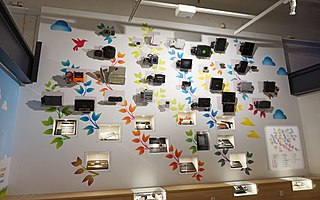
A home video game console is a video game console that is designed to be connected to a display device, such as a television, and an external power source as to play video games. Home consoles are generally less powerful and customizable than personal computers, designed to have advanced graphics abilities but limited memory and storage space to keep the units affordable. While initial consoles were dedicated units with only a few games fixed into the electronic circuits of the system, most consoles since support the use of swappable game media, either through game cartridges, optical discs, or through digital distribution to internal storage.
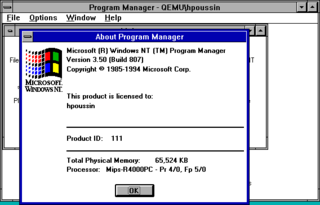
Windows NT 3.5 is a major release of the Windows NT operating system developed by Microsoft and oriented towards businesses. It was released on September 21, 1994, as the successor to Windows NT 3.1 and the predecessor to Windows NT 3.51.
NetBIOS over TCP/IP is a networking protocol that allows legacy computer applications relying on the NetBIOS API to be used on modern TCP/IP networks.

Messenger service is a network-based system notification Windows service by Microsoft that was included in some earlier versions of Microsoft Windows.

FTP Software, Inc., was an American software company incorporated in 1986 by James van Bokkelen, John Romkey, Nancy Connor, Roxanne van Bokkelen, Dave Bridgham, and several other founding shareholders, who met at Toscanini's in Central Square after an email went out over the Bandykin mailing list looking for people interested in starting a company. Their main product was PC/TCP, a full-featured, standards-compliant TCP/IP package for DOS. The company was based in Andover, Massachusetts. It also had a number of offices throughout the United States and overseas.
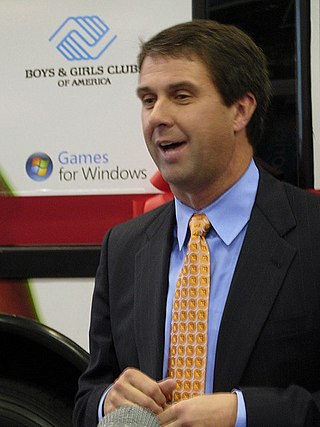
Robert J. Bach, commonly known as Robbie Bach, was the President of Entertainment & Devices Division at Microsoft. He led the division that was responsible for the Xbox, Xbox 360, Zune, Games for Windows, Windows Phone and the Microsoft TV platform. After 22 years at Microsoft, Robbie announced his retirement from Microsoft effective in the fall of 2010. Robbie now speaks to corporate, academic and civic groups across the country and in 2015 completed his first book, Xbox Revisited: A Game Plan for Corporate and Civic Renewal.

Shark! Shark! is an Intellivision game originally designed by Don Daglow, and with additional design and programming by Ji-Wen Tsao, one of the first female game programmers in the history of video games. The player is a fish who must eat smaller fishes in order to gain points and extra lives while avoiding enemies such as larger fishes, sharks, jellyfish, lobsters and crabs. After eating a certain number of fish, the player's fish grows in size and is thus able to eat a larger selection of fish. However, while the larger fish becomes a bit faster, he is less agile than the small fish and has a harder time avoiding enemies.

Zune is a discontinued brand of digital media products and services that was marketed by Microsoft from November 2006 until June 2012. Zune consisted of a line of portable media players, a music subscription service known as Zune Music Pass plus Zune Marketplace for music, TV and movies, streaming services for the Xbox 360 game console, and the Zune software media player for Windows PCs which also acted as desktop sync software for Windows Phone.
The Xbox 360 is a home video game console developed by Microsoft. As the successor to the original Xbox, it is the second console in the Xbox series. It competed with Sony's PlayStation 3 and Nintendo's Wii as part of the seventh generation of video game consoles. It was officially unveiled on MTV on May 12, 2005, with detailed launch and game information announced later that month at the 2005 Electronic Entertainment Expo (E3).

Zune is a discontinued software program that was developed by Microsoft for Windows that functions as a full media player, library, media streaming server, mobile device management, and interface for the discontinued Zune Marketplace. The software is used to sync with all devices with Zune functionality including the Zune 4, 8, 16, 30, 80, 120, Zune HD, Windows Phone 7, and Microsoft Kin. Zune devices work exclusively with the Zune software, which applies many design principles of Microsoft's Metro design language.
Microsoft Corporation has been selling branded hardware since 1980, and developing devices in-house since 1982, when the Microsoft Hardware division was formed to design a computer mouse for use with Microsoft Word for DOS. Since then, Microsoft has developed computer hardware, gaming hardware and mobile hardware. It also produced drivers and other software for integrating the hardware with Microsoft Windows.

The Zune HD is a portable media player in the Zune product family released on September 15, 2009, by Microsoft. It was a direct competitor with Apple's iPod Touch series of mobile devices. It was initially released in 16 and 32 GB capacities. A 64 GB version was released on April 9, 2010. It has a touchscreen interface for navigation and included Wi-Fi for synchronization, access to the Zune Marketplace and Web browsing.

Kin was a short-lived mobile phone line from Microsoft designed for users of social networking. The phones, aimed at people between ages 15 and 30, were manufactured by Sharp Corporation and sold through Verizon Wireless.
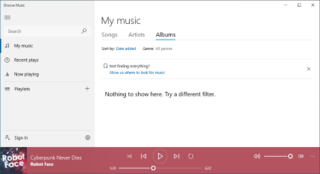
Groove Music is a discontinued audio player software application included with Windows 8, Windows 8.1, Windows 10 and Windows 11.
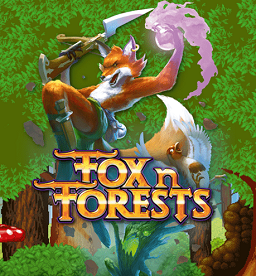
Fox n Forests is a video game developed by German studio Bonus Level Entertainment and published by EuroVideo Medien GmbH for Microsoft Windows, PlayStation 4, Xbox One, and Nintendo Switch. It was released on 17 May 2018. Fox n Forests is a side-scrolling platform game with retro-style graphics.

The Intellivision Amico is a home video game console that is being developed and marketed by Intellivision Entertainment. It was originally slated to be released in October 2020, but repeated delays followed, leaving the console without a release date.

MsQuic is a free and open source implementation of the IETF QUIC protocol written in C that is officially supported on the Microsoft Windows, Linux, and Xbox platforms. The project also provides libraries for macOS and Android, which are unsupported. It is designed to be a cross-platform general purpose QUIC library optimized for client and server applications benefitting from maximal throughput and minimal latency. By the end of 2021 the codebase had over 200,000 lines of production code, with 50,000 lines of "core" code, sharable across platforms. The source code is licensed under MIT License and available on GitHub.














